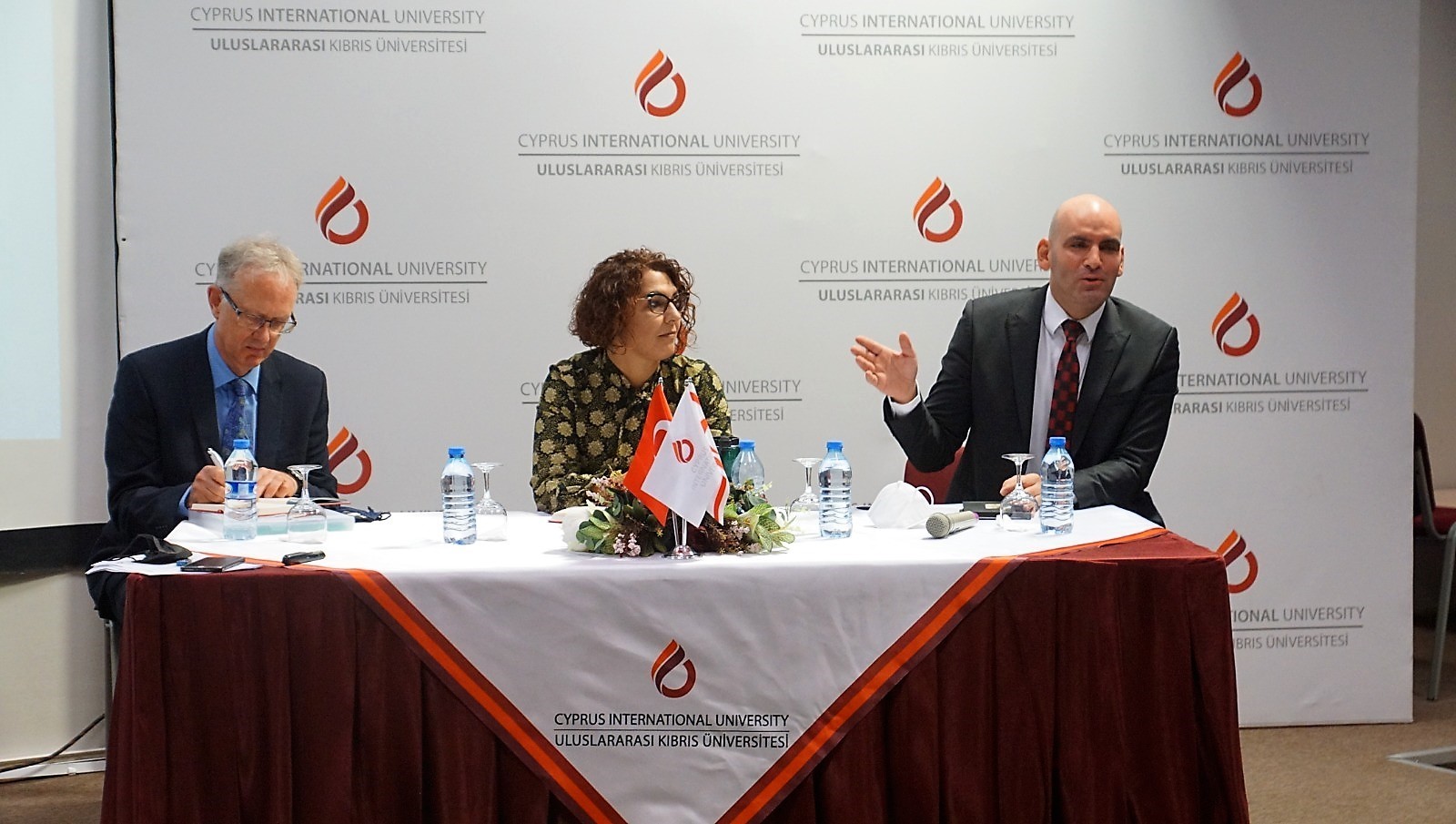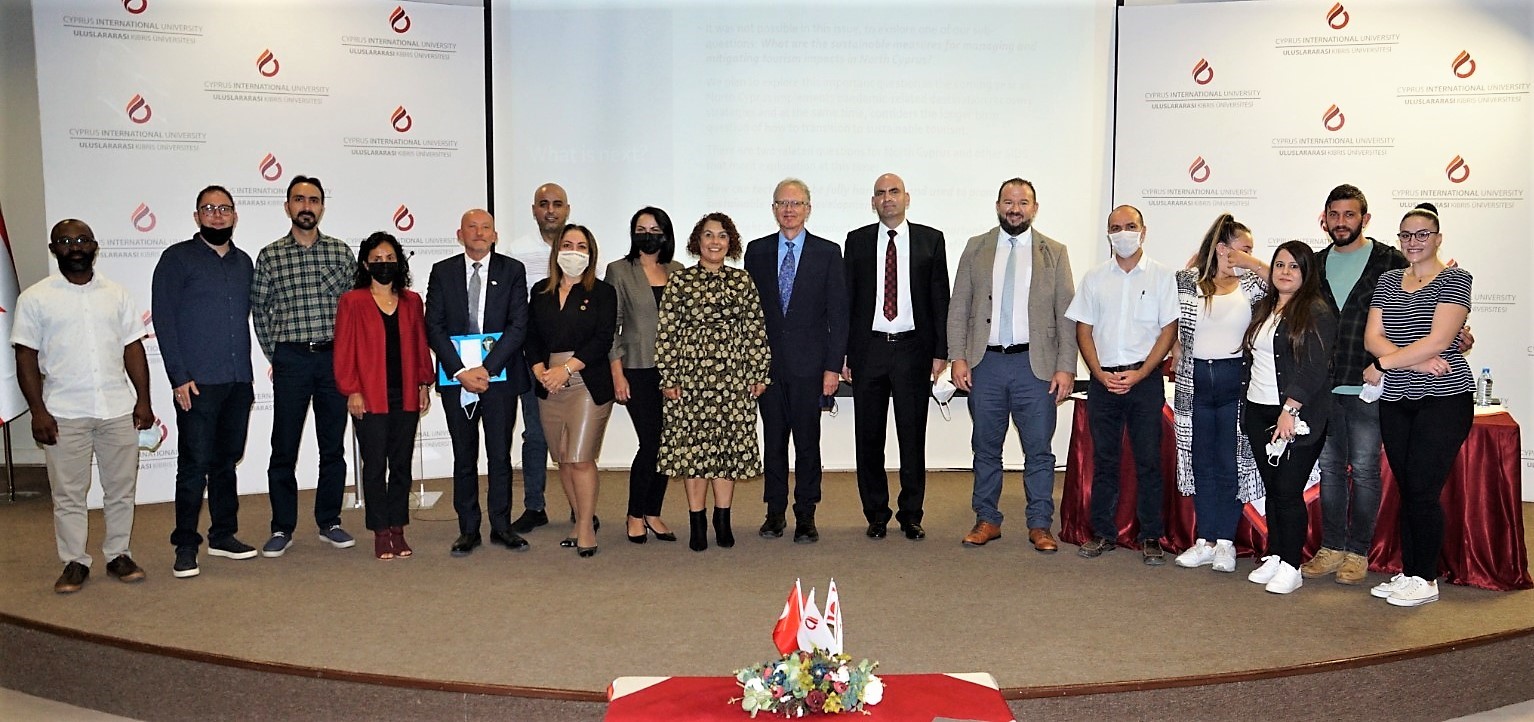Worldwide Hospitality and Tourism Themes (WHATT) v13 n4 2021
Theme Editors Hale Özgit and Ali Öztüren
Theme Issue Launch Event and Discussion at Cyprus International University (CIU)
Nicosia, North Cyprus, Wednesday 27 October 2021 (11am – 1pm)
How could tourism planners and policy makers overcome the barriers to sustainable tourism development in the small island developing state of North Cyprus?
Collaborative planning and discussion between more than thirty academics, industry leaders, local and national government representatives, civic leaders and environmental and policy specialists.
The session opened with an overview of Emerald and the work of Worldwide Hospitality and Tourism Themes (WHATT) from Richard Teare, followed by a briefing for prospective theme editors and a summary of the main outcomes of the theme issue provided by Hale Özgit.

Discussion facilitators:
(left to right: Richard Teare, Hale Özgit and Ali Öztüren)
Questions, discussion and inputs to a theme issue plan for WHATT v14 n4 2022
Given that tourism is one of the two main contributors to the economy of North Cyprus (together with further and higher education) Ali Öztüren and Hale Özgit posed some starting point questions:
- How might different product differentiation opportunities enable small island developing states (SIDS) to conserve resources to enable sustainability benefits for future generations?
- How could we involve more stakeholders in sustainable development?
- Are there any gaps in our analysis? (v13 n4 2021)
Discussion points arising:
V13 n4 2021 includes sector responses relating to accommodation and food and beverage but given that all-inclusive resort/casino operations are becoming more dominant, it would be helpful to focus more attention on the cultural heritage of North Cyprus as a counter-balance to this and to advance the cause for community-led sustainable tourism. This point was developed by Mustafa Zurnacılar, Mayor of Yeniboğaziçi Municipality, who observed that more could be done to share good practice between regions, cities and towns and that the connections between local and central government could be strengthened in order to ensure that the cultural heritage is preserved and that the ecology of the region is protected.
Building on this, the former Minister of Agriculture observed that sustainable tourism development policy is currently too limited and it needs to encompass all aspects of cultural heritage. Environmental Engineer İme Akanyeti also made the point that the current issues and obstacles relating to the sustainability of resources is due to the absence of an inventory of resources and given this gap, industrial development is occurring on an unsustainable basis. In essence, if North Cyprus is unaware of what is unsustainable it is difficult to determine how to transition from this.
Orhan Uludag, Director, School for Tourism and Hotel Management at CIU made the point that further analysis should incorporate a review of transportation for tourism and how this can transition so that it is as sustainable as possible and provide a broader-based form of service and support to tourism.
A number of event participants felt that the voices of numerous stakeholders in tourism and sustainable development were absent from current and future planning discussions and that a broader-based network could help with the task of assembling a more complete picture of what North Cyprus has to offer (cultural heritage) via the compilation of an inventory of assets and resources. It was noted that little is known or published in relation to the current environmental impacts of tourism – for example, how much waste water and solid waste is generated by all-inclusive resorts? If this data could be gathered and the impact quantified, it would provide a basis for future decision-making. A senior representative from the Ministry of Tourism agreed that currently, decision-makers do not have a complete picture of all the components that would enable North Cyprus to present an appealing cultural tourism experience. He also said that the Ministry of Tourism does not have sufficient financial resource to cope with the scale of old building restoration and that incentivising repair and maintenance work is an important factor in enhanced cultural heritage management.
Finally, an industry representative felt that better knowledge dissemination and sharing could help to improve the image of the industry and in so doing, attract more young Cypriots to join the industry.
Ali Öztüren observed that: together, we have identified some of the main problems and touched on possible solutions but what are the missing links that we need to address in our next theme issue?
Returning to the point about the creation of an inventory of cultural tourism resources, it was felt that one possibility might be to create an integrated map, given that every municipality has its own architects and engineers. If then, the effort was coordinated by universities in North Cyprus, could we not engage with all 28 municipalities in this venture? In so doing, this could provide a framework to help advance the case for sustainable tourism development. Allied to this, it was felt that a new, independent sustainable tourism body (separate from but recognised by Government) could facilitate this initiative on a region by region basis. Further, the universities located in North Cyprus could contribute to the creation of a sustainable tourism research team that is tasked with on-going inventory management, audit and research.
Reflecting on the theme issue launch discussion, Ali Öztüren and Hale Özgit feel that tourism stakeholders in North Cyprus are now well aware of the problems that they face and to move forwards they want to focus next on implementable solutions. With this in mind, Hale and Ali have framed the following theme issue question for WHATT v14 n4 2022: Transitioning from unsustainable to sustainable: What are the solutions for tourism industry stakeholders in North Cyprus?

Launch event and discussion hosted by Cyprus International University
Nicosia, North Cyprus, Wednesday 27 October 2021
WHATT Managing Editor Richard Teare offered his thanks to Cyprus International University for hosting the event and to Hale and Ali, the v13 n4 theme issue editors for their outstanding academic and professional leadership, organisation and oversight of the writing team from academia and industry in producing an excellent theme issue. A launch event discussion would not have been possible without the presence of representatives from national and regional government, industry and academia (including members of the writing team) and we are most grateful to them for their thoughtful and constructive inputs. In so doing, they have helped to frame some next steps for sustainable tourism development in North Cyprus, with wider application to other small island developing states.
Hale Özgit, Ali Öztüren and Richard Teare
November, 2021